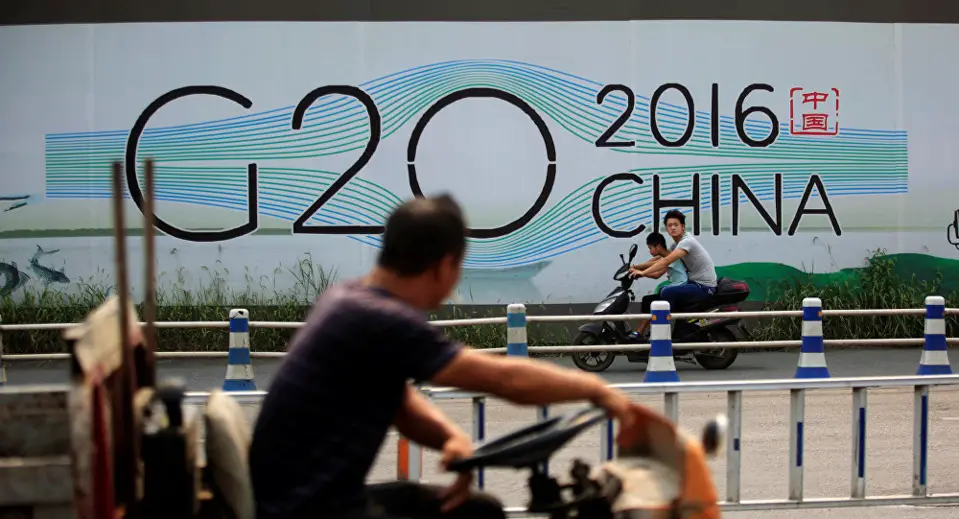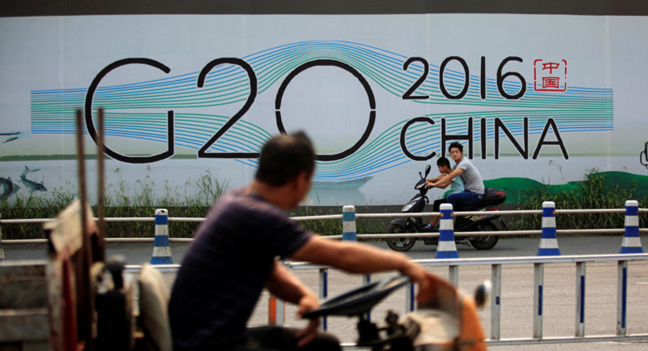Sergey Karataev, Source: People's daily
The world economy has been growing at a roughly 3 percent rate in recent years, a significant step-back compared with previous years. The growth rate of developed countries has been under 2 percent over the last few years with no clear indication of improvement, while that of the developing countries is slowing down as well.
The World Bank and the IMF have downgraded the world economic outlook. Against such global economic uncertainties and the complexities within the G20 itself, China assumed the responsibility and hosted a successful G20 Hangzhou Summit during its presidency.
The crux of the current sluggish world economic growth, on the one hand, lies in the absence of determination among all of the countries to maintain sustained growth and on the other hand, the low efficiency of the measures that some countries have adopted.
In the meantime, growth slowdown in global trade, less active investment and lasting instability in the financial markets also aggravated the world economic recovery. The risks of another global or regional financial crisis still exist.
The G20 Summit played a major role in coping with international financial crisis when it was first established. However, as the world economy gradually recovers, the execution of the G20 was considerably undermined due to disputes in interests among member states.
Though many documents were formulated within the G20 framework, many countries failed to comply with them. For example, the G20 has put forward multiple constructive suggestions on opposing global trade protectionism, but some developed countries have even doubled their protectionist measures.
Under such complex background, China has proposed a series of initiatives on boosting the vitality of the G20 and restoring its global economic governance function with a primary purpose to maintain sustainable growth and reduce current risks.
Even though it is not the first time for the G20 to call on reforming international financial institutions, stimulating investment and advancing structural reform, Chinese proposals enable effective cooperation among major economies.
While focusing on economic agendas, China also called for compromises on disputes. It urged all G20 members to find solutions for current challenges, rather than fixing their attention on the reasons. Instead of joining in the arguments over the effects of adopted monetary stimulus policies, China asked all members to focus on how to boost economic growth through structural reform, taxation policies and fiscal polices.
China also did extensive and in-depth research on supervising outcome implementation and management improvement and gave more saying to developed countries. Under China’s initiative, the G20 Hangzhou Summit has, for the first time, drafted an action plan on implementing the UN 2030 Agenda for Sustainable Development, agreed to advance an early ratification of the Paris Agreement and launched the G20 Initiative on Supporting Industrialization of Africa and Least Developed Countries as well as the Global Infrastructure Connectivity Alliance Initiative, delivering tangible benefits to the people of developing countries.
Now that the Hangzhou Summit has drawn the curtain, time will prove the effectiveness of China’s proposals. Given the experience and results China has accumulated in several multilateral frameworks, people are quite confident of the implementation of the suggestions at the G20 Hangzhou Summit.
(The author is Head of Sector of Foreign Countries Economy of Russian Institute for Strategic Studies.)
The World Bank and the IMF have downgraded the world economic outlook. Against such global economic uncertainties and the complexities within the G20 itself, China assumed the responsibility and hosted a successful G20 Hangzhou Summit during its presidency.
The crux of the current sluggish world economic growth, on the one hand, lies in the absence of determination among all of the countries to maintain sustained growth and on the other hand, the low efficiency of the measures that some countries have adopted.
In the meantime, growth slowdown in global trade, less active investment and lasting instability in the financial markets also aggravated the world economic recovery. The risks of another global or regional financial crisis still exist.
The G20 Summit played a major role in coping with international financial crisis when it was first established. However, as the world economy gradually recovers, the execution of the G20 was considerably undermined due to disputes in interests among member states.
Though many documents were formulated within the G20 framework, many countries failed to comply with them. For example, the G20 has put forward multiple constructive suggestions on opposing global trade protectionism, but some developed countries have even doubled their protectionist measures.
Under such complex background, China has proposed a series of initiatives on boosting the vitality of the G20 and restoring its global economic governance function with a primary purpose to maintain sustainable growth and reduce current risks.
Even though it is not the first time for the G20 to call on reforming international financial institutions, stimulating investment and advancing structural reform, Chinese proposals enable effective cooperation among major economies.
While focusing on economic agendas, China also called for compromises on disputes. It urged all G20 members to find solutions for current challenges, rather than fixing their attention on the reasons. Instead of joining in the arguments over the effects of adopted monetary stimulus policies, China asked all members to focus on how to boost economic growth through structural reform, taxation policies and fiscal polices.
China also did extensive and in-depth research on supervising outcome implementation and management improvement and gave more saying to developed countries. Under China’s initiative, the G20 Hangzhou Summit has, for the first time, drafted an action plan on implementing the UN 2030 Agenda for Sustainable Development, agreed to advance an early ratification of the Paris Agreement and launched the G20 Initiative on Supporting Industrialization of Africa and Least Developed Countries as well as the Global Infrastructure Connectivity Alliance Initiative, delivering tangible benefits to the people of developing countries.
Now that the Hangzhou Summit has drawn the curtain, time will prove the effectiveness of China’s proposals. Given the experience and results China has accumulated in several multilateral frameworks, people are quite confident of the implementation of the suggestions at the G20 Hangzhou Summit.
(The author is Head of Sector of Foreign Countries Economy of Russian Institute for Strategic Studies.)
 Menu
Menu
 Chinese proposals inject confidence into implementation of G20 Summit agenda
Chinese proposals inject confidence into implementation of G20 Summit agenda

















